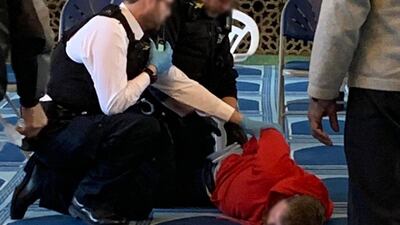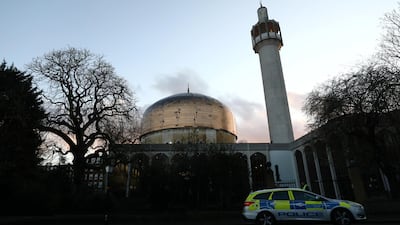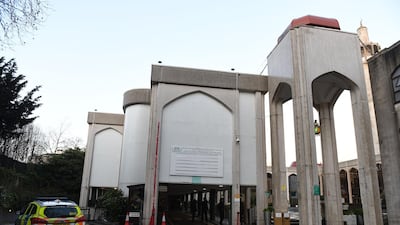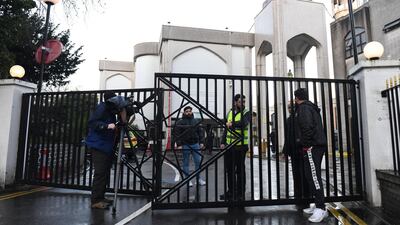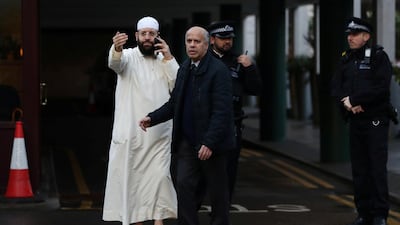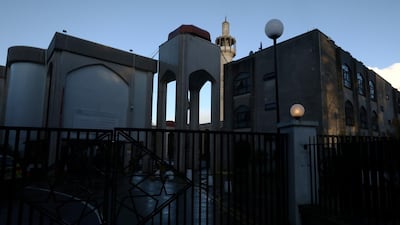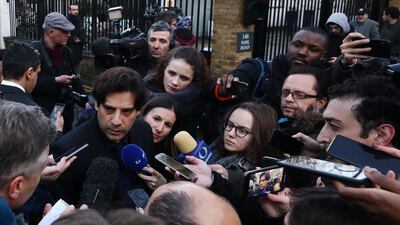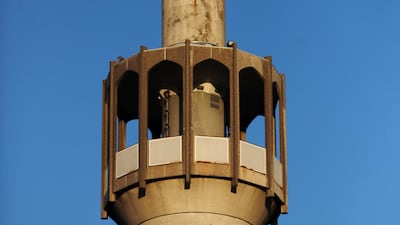A knifeman stabbed a muezzin in the neck at one of London's largest mosques during afternoon prayers, police said on Thursday.
The injured victim, in his seventies, had intervened to prevent the imam from being attacked at London Central Mosque in Regent's Park, witnesses said.
Rafaat Maglad was leading the call to prayer at the busy mosque when he was stabbed with a kitchen knife.
The attacker, 29, reportedly said nothing during the attack but was grappled to the ground and held by worshippers.
Scotland Yard confirmed the attacker had been attending prayers at the mosque but the incident was not being treated as terror-related.
The attacker was an "unknown individual", London Central Mosque said.
A video on Twitter showed a man with a red top sitting cross-legged after being detained by a man in uniform.
He was led away by five police officers after being arrested on suspicion of attempted murder.
"The guy was behind him and he came up with a knife," said worshipper Abdulsalam Watik, 59.
"Then we heard screams. We didn’t know what had happened. He was waiting for us before it started."
Mr Watik said he had seen the attacker before because he had been attending prayers at the mosque for about six months.
“It was 30 seconds of mayhem,” Ayaz Ahmad told Sky News.
The Metropolitan Police said that the victim's injuries were not believed to be life threatening.
Walid Mohammed, 39, who was at the mosque, said: “I personally know Rafaat. He’s genuinely a softly spoken person. He’s someone everyone would say hi to.
“If that could happen to such a lovely man, perhaps we all have to watch our backs when we’re here to pray.”
Mr Maglad was a long-term official at the mosque and had spoken about the 1997 funeral prayers of Dodi Fayed, who died in the car crash that killed Diana, Princess of Wales.
London interfaith leader Mustafa Field said it was unclear what had actually happened.
"Last week we had Britain First threatening mosques in northern Britain," Mr Field said. "We hope that this incident is not linked to extremism.
"But we don’t know what has actually happened. The community in London wants to show that they care and will not be divided."
Fiyaz Mughal, founder of monitor Tell Mama, which charts anti-Muslim violence, told The National: "My colleagues over the past decade have seen a rise in targeting of mosques.
"The bigger picture is clearly there's a risk to faith institutions. The government has to have a programme for security for mosques. We need a fund focused on them."
UK Prime Minister Boris Johnson tweeted to say he was "deeply saddened" by the attack.
"It's so awful that this should happen, especially in a place of worship," Mr Johnson said. "My thoughts are with the victim and all those affected."
A leading Jewish organisation condemned the attack.
“We must learn lessons from history, stop the spread of intolerance and give it no quarter in our politics, media or society,” said Marie van der Zyl, president of the Board of Deputies of British Jews.
Police are to step up their presence in the area, said Sadiq Khan, the Mayor of London.
“Every Londoner is entitled to feel safe in their place of worship and I want to reassure London’s communities that acts of violence in our city will not be tolerated,” Mr Khan wrote on Twitter.
The mosque was closed after the attack as police launched an investigation.
The incident came less than 24 hours after a gun rampage in Germany left 10 dead.
Officials there blamed an extremist who wanted to attack people from the Middle East.
The Regent's Park mosque was built in the 1970s with donations from the rulers of Saudi Arabia and from Sheikh Zayed, the UAE's Founding President.
The attack is the latest to target mosques in the UK, with campaigners highlighting a sharp rise in anti-Muslim violence.
Armed police were called in May after a gunman entered a mosque in east London during Ramadan prayers, and fired a weapon before he was chased out by worshippers.
In June 2017, a right-wing extremist drove a van into a group of Muslims outside the Finsbury Park mosque in north London, killing one man and injuring 10.
Darren Osborne was later convicted of murder after being radicalised online and jailed for a minimum of 43 years.
